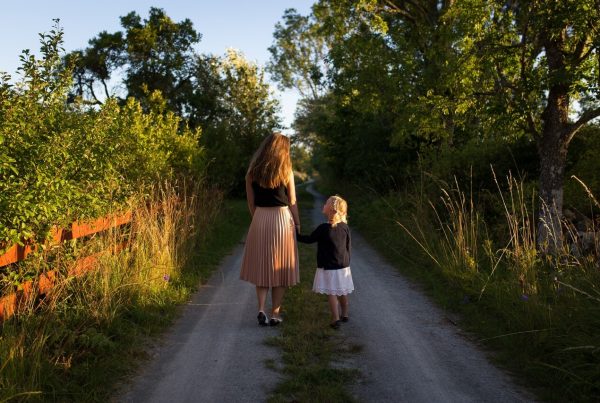Last week Ike, Isaac, and I road tripped from Illinois to North Carolina for my sister-in-law’s wedding. In case you’re wondering how we fared with an infant in tow, we actually did great! Isaac was a real trooper and it couldn’t have gone any better. Plus, we spent hours driving through forested mountains painted with deep reds and shining golds. It was a masterpiece of a view from our tiny car windows.
In addition to the trees, I noticed something else along our drive: Countless billboards and signs advertising haunted houses, haunted forests, haunted prisons, and on and on. I don’t know about you, but it seems like these attractions are becoming more numerous. Maybe I failed to notice them in the past, but they appear to be growing in popularity each year.
As I sat in the car wondering at the number of ghostly attractions we had passed, I remembered a post I wrote two years ago about the show “Ghost Adventures.” In the post I explored a theological concept known as the mysterium tremendum, or “holy dread.” If there was ever a theology of Halloween, this would be it. So, I thought I would re-post an excerpt in preparation for the coming holiday. Christian rejections of Halloween aside, here is a different kind of Christian perspective on the day:
—
Why are people so captivated by stories about ghosts? And more strangely, why do people enjoy being scared by them? In an age when the supernatural realm is so publicly frowned upon and largely absent from mainstream media, why do these shows maintain such unchallenged acceptance?
Well you might be surprised to know that this is a question theologians have studied. In particular, theologian Rudolph Otto and the more familiar C.S. Lewis examined what this desire to be scared by ghosts tells us. According to both Otto and Lewis, the feeling of fear, dread, and awe that we experience when hearing a scary ghost story or watching a show about ghosts is the result of an encounter with the “numinous.” In his book The Problem of Pain, Lewis describes the numinous the following way:
“In all developed religion we find three strands or elements, and in Christianity one more. The first of these is what Professor Otto calls the experience of the Numinous. Those who have not met this term may be introduced to it by the following device. Suppose you were told there was a tiger in the next room: you would know that you were in danger and would probably feel fear. But if you were told ‘There is a ghost in the next room’, and believed it, you would feel, indeed, what is often called fear, but a different kind. It would not be based on the knowledge of danger, for no one is primarily afraid of what a ghost may do to him, but of mere fact that it is a ghost. It is ‘uncanny’ rather than dangerous, and the special kind of fear it excites may be called Dread. With the Uncanny one has reached the fringes of the Numinous. Now suppose that you were told simply ‘There is a mighty spirit in the room’, and believed it. Your feelings would then be even less like the mere fear of danger: but the disturbance would be profound. You would feel wonder and a certain shrinking–a sense of inadequacy to cope with such a visitant and of prostration before it–an emotion which might be express in Shakespeare’s words ‘Under it my genius is rebuked’. This Feeling may be described as awe, and the object which excites is as the Numinous.”
The above description may bring to mind the scene in Isaiah 6:5 when Isaiah stands before the holy God, trembling and confessing, “Woe to me! I am ruined! For I am a man of unclean lips.” That fear, awe, and dread is what a human experiences in the presence of something holy, other, and completely transcendent. It is both a wonderful and frightful experience, and as Lewis explains, we encounter the fringes of that same sensation when interacting with lesser elements of the spiritual realm.
The reason people like to experience this particular kind of fear is that, without realizing it, they are glimpsing an echo of what it’s like to encounter God. Whenever we interact with the metaphysical, whether it is through worship, ghost stories, or even a truly magnificent work of art, it causes our souls to shudder in a way that is both frightening and marvelous. That is why humans seek after that feeling, not knowing that it is ultimately found in God.
—
This week, if you plan to visit a haunted house, watch a scary movie, or decorate your home with spooky sights and sounds, remember Lewis’ words and what this holiday reflects to us about the human soul.
And also, have fun! Happy Halloween!






I hope you had a blast at the wedding! love this unique approach to Halloween
Thanks, Margaret!